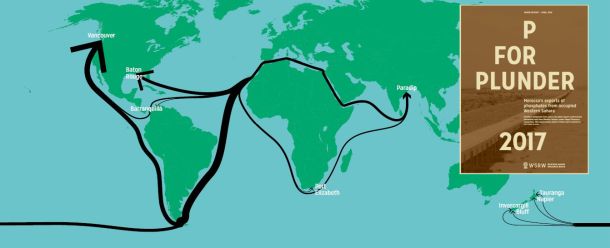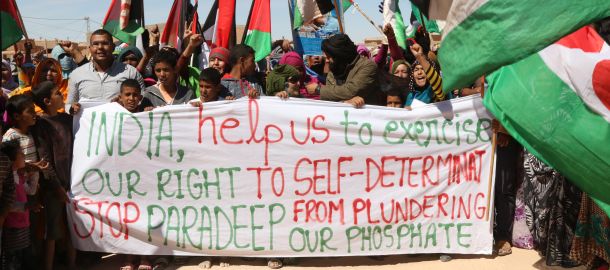
Sydney barrister is calling on three major Australian companies to stop their imports from occupied Western Sahara, saying the firms might be liable to future compensation claims from the people of the territory. ABC, 10 October 2011.
Read also: Australian Lawyer questions legality of phosphate imports
ABC National Radio: The World Today story on Phosphate
Samantha Donovan reported this story 10 October 2011
Listen to MP3 of this story
Alternate wma version or mp3 download.
ELEANOR HALL: A lawyer advising the Australian Western Sahara Association is warning that Australian companies that continue to import phosphate rock from the disputed territory of Western Sahara may be liable for compensation.
Sydney barrister Tim Robertson SC is calling on three major Australian companies to stop their imports from the region.
He says they are breaching international law by buying the phosphate from a state-owned Moroccan company, which has no right to sell the resource, as Samantha Donovan explains.
SAMANTHA DONOVAN: Superphosphate fertilisers are crucial for Australian food production. To make the fertiliser three Australian companies use phosphate rock from Western Sahara - Incitec Pivot, Impact Fertilisers and CSBP, which is part of Wesfarmers.
Since the 1990s, they've been aware of claims by Western Sahara activists that Morocco doesn't have the right to sell the product to them.
The Fertiliser Industry Federation of Australia represents the companies and says they've all had legal advice that their buying of phosphate doesn't breach international law.
But Sydney barrister Tim Robertson SC disagrees.
His opinion was sought by the Australia Western Sahara Association which campaigns for the self-determination of the Indigenous population.
TIM ROBERTSON: The state that is in control of Western Sahara - Morocco - is an illegal occupying power and it has no title to the resources that it's selling to the Australian companies. So the Australian companies can't gain any better title than Morocco has and Morocco has none, so they're in a spot of bother.
SAMANTHA DONOVAN: Morocco fiercely disagrees that it is an illegal occupying power. It told an Australian Government hearing earlier this year that "no recognised international body has ever considered the exploitation of the natural resources by Morocco as acts of plundering detrimental to the inhabitants of the region".
Tim Robertson though believes the Australian phosphate importers could end up having to pay compensation.
TIM ROBERTSON: Someone could come along with a better right of title such as the government-in-exile for Western Sahara, which is recognised by a third of the countries in the world including most African countries, it might come along and say well these resources belong to the people of Western Sahara under international law as they do and as the General Assembly of the United Nations has declared on numerous occasions, therefore they belong to us and you're taking it.
SAMANTHA DONOVAN: Tim Robertson SC also believes the Australian fertiliser companies could be breaching the Customs Act.
TIM ROBERTSON: Many of them are stating on their import declarations that the goods are from Morocco. They're not and if they've put down on the manifest that they've supplied to customs that the country of origin is Morocco then they are breaching the Customs Act and that is a criminal offence.
SAMANTHA DONOVAN: Tim Robertson says that ultimately this type of dispute is only ever settled through international politics.
A spokeswoman for the Department of Foreign Affairs and Trade says that Australia recognises the UN classification of Western Sahara as a non-self-governing territory and the Government believes the people of Western Sahara have a right to self-determination.
She pointed out the UN hasn't imposed restrictions on the trade of phosphates and says DFAT recommends that companies do seek legal advice before importing it.
ELEANOR HALL: Samantha Donovan reporting.
New report: Western Sahara phosphate trade halved
The export of phosphate rock from occupied Western Sahara has never been lower than in 2019. This is revealed in the new WSRW report P for Plunder, published today.
New report on Western Sahara phosphate industry out now
Morocco shipped 1.93 million tonnes of phosphate out of occupied Western Sahara in 2018, worth an estimated $164 million, new report shows. Here is all you need to know about the volume, values, vessels and clients.
New report on contentious Western Sahara phosphate trade
Morocco shipped over 1.5 million tonnes of phosphate out of occupied Western Sahara in 2017, to the tune of over $142 million. But the number of international importers of the contentious conflict mineral is waning, WSRW's annual report shows.
New report on global phosphate trade from occupied Western Sahara
Over 200 million dollars worth of phosphate rock was shipped out of occupied Western Sahara last year, a new report from WSRW shows. For the first time, India is among the top importers.



